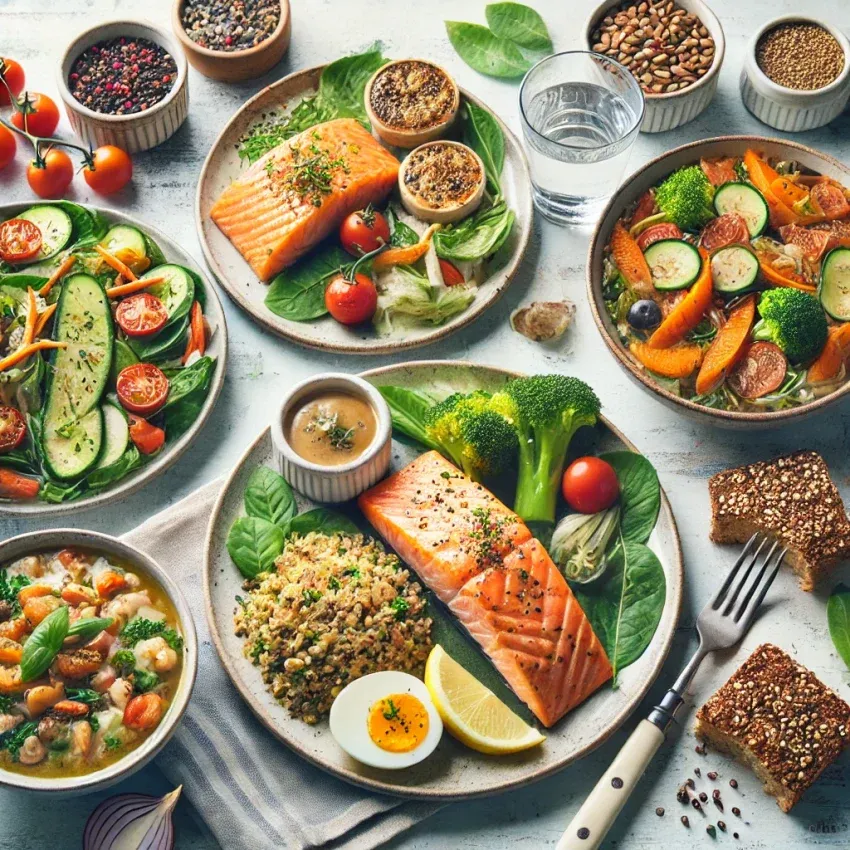Introduction: Why Healthy Dinners Matter for Seniors
As we age, our bodies undergo various changes that make it essential to focus on nutrition for overall health and vitality. For seniors, healthy dinners are crucial in supporting physical, mental, and emotional well-being. A balanced dinner can help maintain energy levels, support cognitive function, promote heart health, and improve digestion—all of which are key to healthy aging.
One of the most important aspects of a senior’s diet is incorporating nutrient-dense foods that provide a good balance of macronutrients (proteins, fats, and carbohydrates) as well as essential vitamins and minerals. Lean proteins, fiber-rich vegetables, whole grains, and healthy fats should be staples in their meals. This combination helps maintain muscle mass, keeps bones strong, and boosts immune function, making it easier to stay active and independent.
Hydration is equally important and often overlooked. Seniors are at higher risk of dehydration, which can lead to fatigue, confusion, and even more serious complications like urinary tract infections. Including water-rich foods like vegetables, soups, and fruits in healthy dinner meals for seniors can help with hydration.
Finally, portion control plays a key role. As metabolism slows with age, it becomes necessary to adjust portion sizes to avoid overeating while ensuring sufficient nutrients are consumed. Seniors should aim for well-balanced meals that offer satisfaction without overwhelming the digestive system.
1. Baked Salmon with Steamed Veggies 🐟🥦
Baked salmon paired with steamed vegetables is an excellent, nutrient-dense dinner option for seniors. Salmon is rich in omega-3 fatty acids, which are crucial for heart health and can help reduce inflammation throughout the body. For older adults, these healthy fats are especially beneficial as they support cardiovascular function, improve cholesterol levels, and may reduce the risk of stroke. Additionally, omega-3s are known to enhance brain health, potentially slowing cognitive decline and improving memory retention.
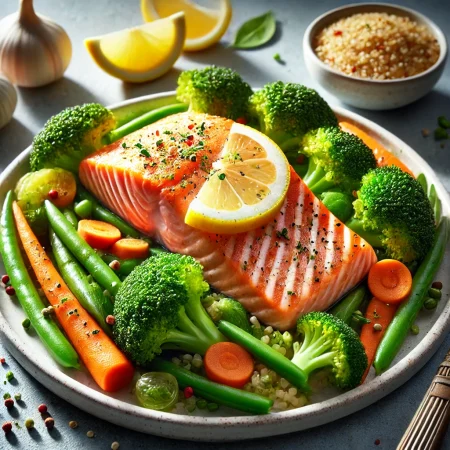
Salmon is also a great source of high-quality protein, which is important for maintaining muscle mass and strength as we age. Protein helps support muscle repair, immune function, and overall energy levels. The combination of salmon with steamed vegetables makes for a well-rounded meal that is easy to prepare and digest.
Steamed vegetables like broccoli, carrots, or green beans complement the salmon by adding essential vitamins and minerals. Broccoli is rich in vitamins C and K, both of which support immune function and bone health, while carrots provide beta-carotene, which is beneficial for eye health. Steaming the vegetables preserves their nutrient content and keeps the meal light on the digestive system, which is often beneficial for seniors who may experience slower digestion.
For added flavor, consider squeezing fresh lemon juice over the salmon and vegetables, or seasoning the fish with herbs like dill or parsley. This meal can be served with a small portion of quinoa, brown rice, or a baked sweet potato to provide fiber and additional complex carbohydrates, offering a balanced and satisfying dinner for older adults.
Nutritional Benefits:
- Heart Health: Omega-3 fatty acids in salmon help reduce inflammation, support cardiovascular health, and lower the risk of heart disease.
- Muscle Maintenance: The high-quality protein in salmon aids in muscle repair and maintenance, essential for seniors to stay active and strong.
- Bone Health: Steamed vegetables like broccoli are rich in Vitamin K and calcium, which are key nutrients for maintaining strong bones.
- Eye Health: Carrots, rich in beta-carotene, promote good vision and protect against age-related macular degeneration.
2. Chicken and Vegetable Stir-Fry 🍗🥕
Chicken and vegetable stir-fry is one of the best Healthy Dinner Meals for Seniors offering a quick, flavorful, and nutrient-packed dinner option for seniors. This dish provides a well-balanced combination of lean protein, fiber, and a variety of essential vitamins and minerals, making it an ideal choice for supporting healthy aging.
Chicken is an excellent source of lean protein, which plays a vital role in preserving muscle mass and strength, particularly important as we age. Protein is also essential for the repair of tissues and the maintenance of a strong immune system. Using skinless chicken breast helps keep the dish low in unhealthy fats while ensuring that the protein content remains high.
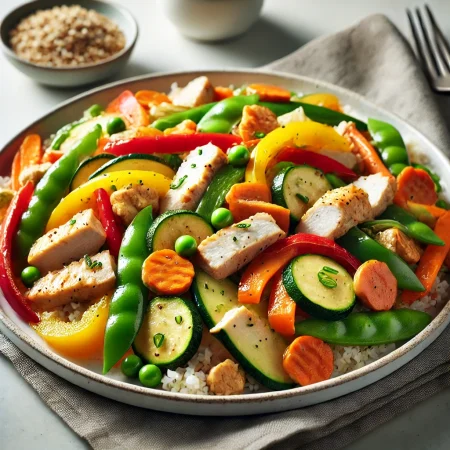
Vegetables like bell peppers, zucchini, carrots, and snap peas add color, texture, and a wide array of nutrients to the stir-fry. Bell peppers, for instance, are packed with vitamin C, which supports immune function and skin health. Carrots provide beta-carotene for eye health, and zucchini is rich in fiber, which aids digestion. Snap peas offer antioxidants that help combat oxidative stress, a factor linked to aging and various chronic diseases.
To keep the stir-fry heart-healthy, it’s important to use heart-friendly oils like olive or avocado oil in moderation. Low-sodium soy sauce or coconut aminos can add flavor without adding excessive salt, helping to manage blood pressure.
For a complete meal, the stir-fry can be served over a small portion of whole grains such as brown rice or quinoa, adding fiber and complex carbohydrates to the dish for long-lasting energy.
Nutritional Benefits:
- Muscle Maintenance: Lean chicken provides high-quality protein that supports muscle repair and strength, vital for maintaining mobility.
- Immune Support: Bell peppers are rich in vitamin C, which boosts the immune system and helps the body fight infections.
- Eye Health: Carrots provide beta-carotene, an antioxidant that supports good vision and helps protect against age-related eye conditions.
- Digestive Health: Zucchini and other fiber-rich vegetables aid digestion, promoting regularity and gut health.
- Heart Health: Using heart-healthy oils and low-sodium seasonings keeps the dish low in unhealthy fats and sodium, supporting cardiovascular function and managing blood pressure.
3. Lentil Soup with Whole Grain Bread 🥣🍞
Lentil soup is a hearty, nutritious dinner that is perfect for seniors, offering a wealth of health benefits. Lentils are rich in plant-based protein and fiber, making this meal satisfying and beneficial for digestive health. Fiber is particularly important for older adults, as it helps maintain regular bowel movements and prevent constipation, which can be common as we age.
Lentils are also an excellent source of iron, a nutrient that supports energy levels and helps prevent anemia, which can lead to fatigue in seniors. They are packed with folate and magnesium, two nutrients that promote heart health by helping to regulate blood pressure and support proper blood flow.
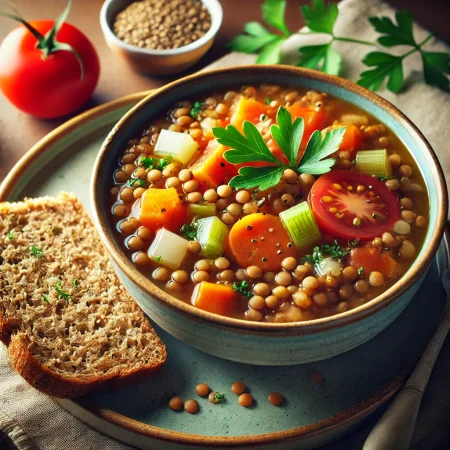
One of the key benefits of lentil soup is its versatility. You can add a variety of vegetables like carrots, celery, tomatoes, and spinach to the soup, increasing the nutritional content and adding more flavor and texture. These vegetables provide essential vitamins and minerals, such as vitamin A, vitamin C, and potassium, which support immune function, skin health, and electrolyte balance.
Pairing the soup with a slice of whole grain or sprouted bread adds additional fiber and complex carbohydrates, keeping energy levels steady throughout the evening.
Nutritional Benefits:
- Digestive Health: Lentils are high in fiber, promoting healthy digestion and preventing constipation.
- Heart Health: Folate and magnesium in lentils support cardiovascular function and help lower blood pressure.
- Iron Intake: Lentils provide plant-based iron, reducing the risk of anemia and fatigue.
- Immune Support: Vegetables in the soup offer vitamins A and C, boosting immune system function.
- Steady Energy Levels: Whole grain bread adds complex carbohydrates, ensuring sustained energy without spikes in blood sugar.
4. Grilled Turkey and Avocado Wrap 🦃🥑
A grilled turkey and avocado wrap is a quick, nutritious, and delicious dinner option for seniors that provides a good balance of lean protein, healthy fats, and fiber. Turkey is an excellent source of lean protein, which helps maintain muscle mass and supports tissue repair—both crucial for seniors to stay strong and active. Opting for grilled turkey breast keeps the meal low in saturated fat, making it heart-healthy.
Avocado adds a creamy texture to the wrap while contributing heart-healthy monounsaturated fats. These fats not only support cardiovascular health but also help reduce bad cholesterol (LDL) levels, which is particularly important for seniors who may be at risk for heart disease. Avocados are also rich in potassium, which helps regulate blood pressure and balance electrolytes.
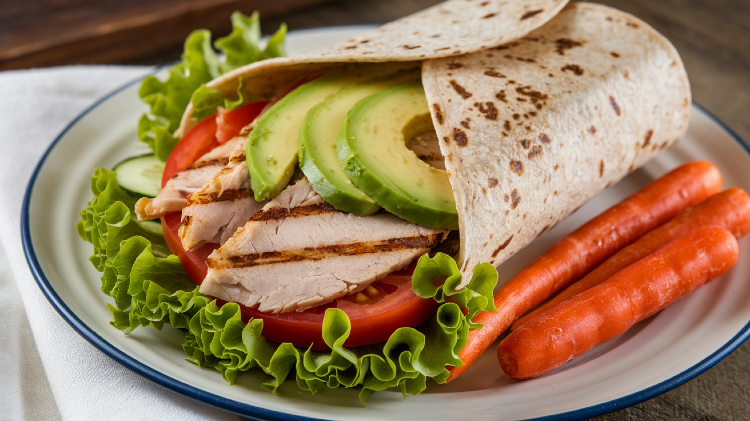
To make the wrap more nutritious, you can add a variety of fresh vegetables such as lettuce, tomatoes, and cucumber. These veggies provide essential vitamins, minerals, and antioxidants that support overall health and immunity. Using a whole grain wrap boosts the fiber content, promoting healthy digestion and helping maintain steady blood sugar levels.
This meal is not only easy to prepare but also easy to customize. For seniors who are managing specific health conditions, this wrap can be made with low-sodium turkey or a lettuce wrap to reduce carbohydrate intake.
Nutritional Benefits:
- Muscle Maintenance: Turkey is a lean protein that supports muscle strength and repair, essential for maintaining mobility as we age.
- Heart Health: Avocado provides heart-healthy monounsaturated fats, which help lower LDL cholesterol and support cardiovascular function.
- Blood Pressure Regulation: Avocados are high in potassium, which helps regulate blood pressure and prevent hypertension.
- Digestive Health: Whole grain wraps add fiber, promoting digestive regularity and preventing constipation.
5. Vegetable and Bean Chili 🌶️🌽
Vegetable and bean chili is a comforting, nutrient-rich meal that is perfect for seniors looking to enjoy a hearty yet healthy dinner. This dish combines a variety of vegetables, legumes, and spices, offering a well-balanced meal that’s rich in plant-based protein, fiber, and essential vitamins and minerals. Beans, such as black beans, kidney beans, or pinto beans, serve as the primary source of protein in this chili, making it a great option for those seeking a meatless meal. The high fiber content in beans promotes digestive health and helps to regulate blood sugar levels, which is important for seniors, particularly those managing diabetes.
The vegetables in the chili, such as tomatoes, bell peppers, onions, and zucchini, provide a range of antioxidants and vitamins. Tomatoes are an excellent source of lycopene, an antioxidant that supports heart health and may help reduce the risk of certain cancers. Bell peppers add a boost of vitamin C, supporting immune function and skin health.
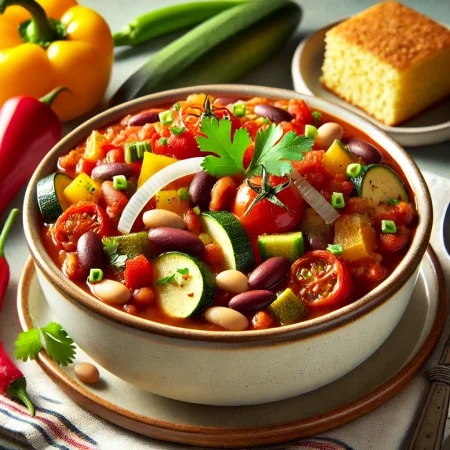
The chili can be lightly spiced with chili powder and cumin, both of which add flavor and contain anti-inflammatory properties that may help reduce joint pain and inflammation in seniors.
This meal can be served on its own or with a side of whole-grain cornbread or brown rice for added fiber and complex carbohydrates.
Nutritional Benefits:
- Plant-Based Protein: Beans provide protein, essential for maintaining muscle mass and tissue repair.
- Heart Health: Tomatoes contain lycopene, which promotes cardiovascular health and may reduce the risk of heart disease.
- Digestive Health: The fiber in beans and vegetables promotes healthy digestion and helps prevent constipation.
- Immune Support: Bell peppers are rich in vitamin C, which boosts the immune system and supports healthy skin.
6. Spinach and Feta Stuffed Chicken Breast 🍽️🥬
Spinach and feta stuffed chicken breast is a flavorful, nutrient-packed meal that combines lean protein with nutrient-dense vegetables, making it an excellent choice for seniors looking to maintain their health. Chicken breast is a great source of lean protein, essential for preserving muscle mass, especially as we age. It is also low in fat, making it heart-healthy and a good choice for those looking to control their cholesterol levels.
The stuffing of spinach and feta cheese not only adds flavor but also boosts the nutritional value of the dish. Spinach is rich in vitamins A, C, and K, which are important for immune function, skin health, and bone strength. Feta cheese provides a good source of calcium, supporting bone health, which is critical for preventing osteoporosis in seniors.

This meal is easy to prepare and pairs well with a side of roasted vegetables or a small portion of whole grains, like quinoa or brown rice, for added fiber and long-lasting energy.
Overall, spinach and feta stuffed chicken breast provides a well-balanced meal that is both satisfying and beneficial for overall health.
Nutritional Benefits:
- Muscle Maintenance: Chicken breast offers lean protein, supporting muscle repair and maintenance.
- Bone Health: Spinach is rich in vitamin K and feta provides calcium, both essential for maintaining strong bones.
- Immune Support: Spinach offers vitamins A and C, promoting immune function and protecting against infections.
- Heart Health: Chicken breast is low in saturated fats, supporting cardiovascular health.
7. Quinoa and Grilled Veggie Bowl 🍆🍅
A quinoa and grilled veggie bowl is a versatile and nutrient-dense dinner option that’s perfect for seniors looking to maintain balanced nutrition while enjoying vibrant flavors. Quinoa, a whole grain rich in protein and fiber, serves as the base of this meal. It’s a complete protein, meaning it contains all nine essential amino acids that the body needs, making it an excellent choice for seniors to help preserve muscle mass and support tissue repair.
Grilled vegetables, such as zucchini, eggplant, cherry tomatoes, and bell peppers, add a rainbow of nutrients to this dish. Each of these vegetables is packed with antioxidants, vitamins, and minerals that promote overall health. For instance, cherry tomatoes are rich in lycopene, which supports heart health and may protect against certain cancers. Zucchini and eggplant offer fiber, supporting healthy digestion and keeping the gut functioning well.
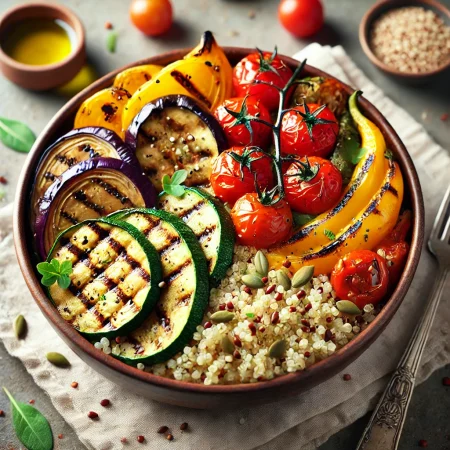
This dish can be dressed with heart-healthy olive oil and balsamic vinegar for a burst of flavor, and a sprinkle of seeds, such as sunflower or pumpkin seeds, can add healthy fats and additional nutrients like magnesium and zinc, which are beneficial for bone health and immunity.
Quinoa and grilled veggie bowls are easy to prepare, customizable, and can be enjoyed either warm or cold, making them a convenient option for seniors.
Nutritional Benefits:
- Complete Protein: Quinoa contains all nine essential amino acids, supporting muscle maintenance and tissue repair.
- Heart Health: Lycopene from tomatoes and healthy fats from olive oil promote cardiovascular health.
- Digestive Health: Fiber from quinoa and grilled vegetables supports regular digestion and prevents constipation.
- Antioxidant Boost: Grilled vegetables, rich in vitamins A and C, provide antioxidants that combat oxidative stress and inflammation.
- Bone Health: Seeds like sunflower or pumpkin provide magnesium and zinc, essential for maintaining strong bones and supporting immune function.
Conclusion: Balanced Eating for Healthy Aging
Balanced eating is a cornerstone of healthy aging, helping seniors maintain their vitality, energy levels, and overall well-being. By incorporating a variety of nutrient-dense foods, including lean proteins, whole grains, healthy fats, and a colorful assortment of fruits and vegetables, seniors can ensure that their bodies receive the essential nutrients needed for optimal function. These foods not only provide the building blocks for maintaining muscle mass, supporting bone health, and enhancing cognitive function, but they also promote cardiovascular health and aid in digestion, which is crucial as the body ages.
Focusing on portion control is equally important, as metabolism slows with age and excessive calorie intake can lead to unwanted weight gain and digestive issues. Smaller, nutrient-rich meals can help seniors avoid feeling sluggish while still meeting their nutritional needs. Hydration should not be overlooked either, as seniors are at higher risk of dehydration. Including water-rich foods, such as soups and fruits, alongside regular fluid intake can support hydration levels.
Overall, a balanced diet can help seniors feel more energized, stay active, and manage chronic conditions more effectively. By prioritizing whole, fresh ingredients and making mindful food choices, seniors can enjoy the benefits of healthy aging and lead fulfilling, independent lives for years to come.


